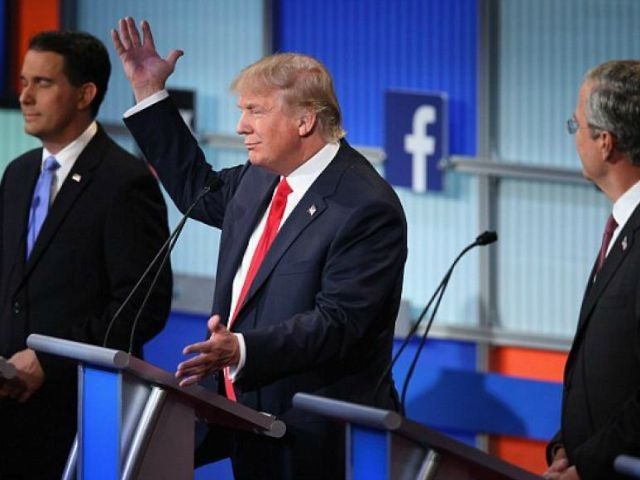Last Thursday night, Fox News anchor Bret Baier led off the 2016 Republican presidential debate season with a show-of-hands question, presumably aimed at Donald Trump:
Is there anyone on stage, and can I see hands, who is unwilling tonight to pledge your support to the eventual nominee of the Republican party and pledge to not run an independent campaign against that person. Again, we’re looking for you to raise your hand now — raise your hand now if you won’t make that pledge tonight.
Trump, naturally, raised his hand. This prompted Baier to iterate and reiterate his shock at Trump’s response: “Mr. Trump, to be clear, you’re standing on a Republican primary debate stage–the place where the RNC will give the nominee the nod. Experts say an independent run would almost certainly hand the race over to Democrats and likely another Clinton.”
Trump’s response: “I fully understand.” Why, exactly, did Trump refuse to endorse any potential Republican candidate? Out of pure, stupid egotism: “I’m, you know, talking about a lot of leverage. We want to win, and we will win. But I want to win as the Republican.” Ironically, Rand Paul (R-KY)–whose own father, Ron, ran as a third party candidate–bashed Trump for his statements.
There’s no question that if Trump ran third party, he’d hand the presidency to Hillary Clinton. According to a Rasmussen poll Monday, “29% of Likely US Voters say they are at least somewhat likely to vote for Trump if he is not chosen as the GOP nominee and runs as a third party candidate.” Some 14% said they were “very likely” to vote for him as a third party candidate.
Meanwhile, on the other side of the aisle, socialist Bernie Sanders (I-VT) now leads alleged criminal and former Secretary of State Hillary Clinton in New Hampshire. But even as Sanders stumps for the presidency, and even as increasing numbers of Democratic voters turn to him as a “more honest” alternative to Hillary Clinton, he refuses to bash Clinton or discuss a third party run. “If it happens that I do not win that process, would I run outside the system? No, I made the promise that I would not and I will keep that promise,” he explained. “And the reason for that is I do not want to be responsible for electing some right-wing Republican to be President of the United States.”
The Sanders-Clinton alliance of political convenience demonstrates a remarkable solidarity among Democrats: they sublimate their political principles to the success of the party. Their excuse: the Democratic Party continues to be a successful vehicle for leftism.
Because conservatives dread the notion of a Hillary Clinton presidency, widespread consternation followed Trump’s third party musings. That’s why Trump was booed when he said that he would consider running third party. Those who objected were correct to be annoyed by The Donald’s pronouncement, but not for the reason they think: running third party out of pure spite is idiotic, but running third party because the nominee of your party is unacceptable is a different story. This, in fact, is one of the key differences between Republicans and Democrats. If Democrats nominate Lincoln Chafee today, leftists will still show up to vote for him; if Republicans nominate Jeb Bush, many conservatives will stay home.
They’ll stay home because, unlike the Democratic Party, the Republican Party has ill-served its constituents generally. We were promised smaller government; instead, we have been given expanded spending, with our twice-elected Republican president jacking up spending to record rates. We were promised border enforcement; instead, we have been handed a fully-funded Obama executive amnesty program, and the Republican nominee in 2008 supported soft border policy. We were promised an end to Obamacare; instead, Obamacare has been fully funded, and the Republican nominee in 2012 invented Obamacare in his state. We were promised an end to the funding of Planned Parenthood; instead, Planned Parenthood funding hasn’t been touched.
This isn’t to say that Donald Trump is right; he’s not. It’s to say that all the other Republican candidates are wrong. Every Republican candidate should have raised his hand when asked who would not blindly support the eventual Republican nominee, should have said, “It depends on the nominee.” Trump puts himself first, which is gross. But Republicans should always put principle before party.
No conservative wants to see conservatives stay home in 2016, or a third party emerge that will foreclose the possibility of conservative victory. But if conservatives fall for the political trap of voting Republican over and over, even as the Republican Party betrays the principles for which they stand and simultaneously takes their votes for granted, conservatives lose both their principles and their party.
Ben Shapiro is Senior Editor-At-Large of Breitbart News and author of the book, The People vs. Barack Obama: The Criminal Case Against The Obama Administration (Threshold Editions, June 10, 2014). Follow Ben Shapiro on Twitter @benshapiro.

COMMENTS
Please let us know if you're having issues with commenting.